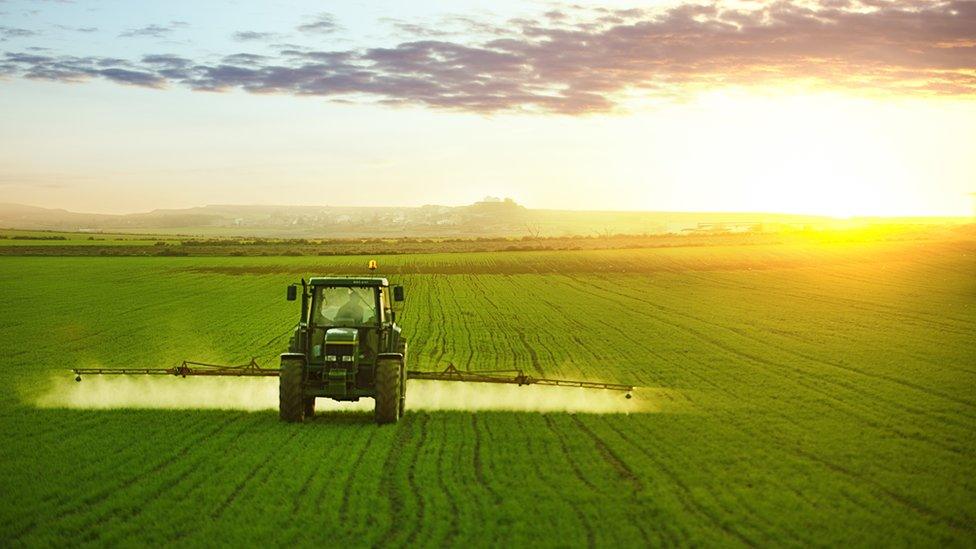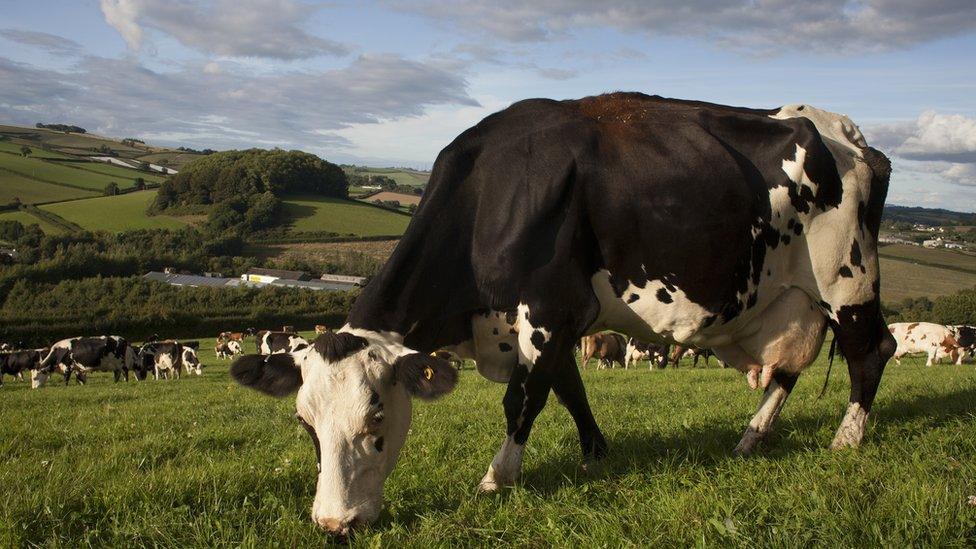UK government to pay older farmers to retire
- Published

Ministers hope the scheme will create opportunities for a younger, more eco-savvy, generation to own farmland
Older farmers in England will be paid to retire under a UK government scheme to bring new blood into the trade.
The average farmer could receive a lump sum payment of £50,000 - capped at £100,000 for farmers with most land.
It is part of a massive overhaul of farm grants, incentivising farmers to protect the environment.
Some older farmers are resistant to new "green" methods, Environment Secretary George Eustice believes, and he wants them to move on.
Next steps in England's rural revolution unveiled
‘Radical’ changes to farming in post-Brexit plan
UK farmers to need 'thousands of foreign workers'
Currently, under the old EU system, farmers receive grants based largely on the amount of land they farm.
The average farmer currently receives about £21,000 in grants - although those who own large amounts of land, such as the Queen, have been receiving more than half a million pounds each year.
Farmers in Wales are expected to be able to benefit from a similar scheme to the England plans announced by Mr Eustice. Plans in Scotland and Northern Ireland will be different.
New green shoots
Mr Eustice says the EU's grants system encourages some farmers "to coast, to take no risks" and hold on to their land in order to collect the subsidy.
Hence the need for help for older farmers to move on.
At the Oxford Farming Conference earlier this year, Mr Eustice said some veteran farmers were "standing in the way of change" and coasting along on state subsidies.
He said: "I understand the burden of expectation that can exist to loyally continue the family tradition (of farming) and how this sometimes stands in the way of change."
But, he said: "A fresh perspective can make a world of difference. New entrants are the lifeblood of any vibrant industry and farming is no exception."
A spokesman for the Department for Environment, Food and Rural Affairs (Defra), told BBC News: "There's evidence that farmers who wish to leave farming can find it difficult to generate capital to do so.
"So, a lump sum payment could help contribute to the costs of moving somewhere new or moving into an alternative sector."
Nearly four in 10 UK farmers are over the age of 65, with an average age of 59.

The agriculture sector accounts for about 9 per cent of the UK's annual greenhouse gas emissions
The Tenant Farmers' Association sought the views of 360 farmers and reported that three-quarters of them were seriously interested in the proposed retirement scheme, which is launched in a consultation today.
The organisation's chief executive, George Dunn, told BBC News he supported the plan for a lump sum for farmers based on the grants they would have received if they'd stayed in business.
But he warned: "The government have got to make it easy enough for people to take up the scheme - not drown them in bureaucracy.
"The payments on their own won't be enough - but when you tie in other factors such as selling livestock, some farmers will want to take it up.
"For people on larger holdings, it won't be very attractive - but a lot of owner-occupiers might find it attractive."
At the launch of today's consultation, Mr Eustice explained: "We need to address the twin challenges of helping new entrants fulfil their dream and gain access to land, while also helping an older generation retire with dignity.
"Our exit scheme will offer farmers real incentive to confront what can often be a difficult decision and will help them clear bills and settle debts."
A spokesperson for the National Farmers' Union (NFU) said: "As our agricultural support is overhauled, farm businesses across the country will be making life-changing decisions about the future of their farm."
They added: "We want to see a fair transition which allows farmers who are considering leaving the industry to have sufficient time and information to make those life-changing decisions."
About £3bn of state subsidy is paid to UK farmers each year, but this will be phased out. An estimated 61% of farm income comes from subsidy.
Under the new post-Brexit scheme, grants will be used to incentivise so-called "public goods", such as protecting water supplies; holding floodwater on land; capturing carbon in soil and trees, and increasing wildlife.
The government believes that younger farmers will be more open to new nature-friendly ideas and more inclined to seek income by diversifying into businesses such as camping or glamping.
Clarification 8th March 2022: This article was amended on the day of publication to make clear that the scheme is for older farmers in England and that farmers in Wales are expected to be able to benefit from a similar scheme, while plans in Scotland and Northern Ireland will be different.
Follow Roger on Twitter., external